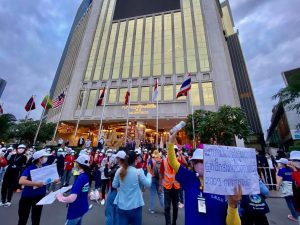On November 26, police in Cambodia re-arrested the prominent union leader Chhim Sithar, who has led a year-long strike outside the NagaWorld casino in the capital Phnom Penh. According to a statement from, Licadho, a local human rights group, the unionist was arrested at the Phnom Penh International Airport after returning from Australia, where she attended a 12-day trade union conference.
Chhim Sithar’s fate encapsulates the Cambodian government’s hostility to labor organizing. In January of this year, a month after the NagaWorld strikes began, Chhim Sithar, the leader of the Labor Rights Supported Union of Khmer Employees (LRSU), was arrested and spent 74 days in pretrial detention on charges of “incitement to commit a felony.” Licadho said that she was re-arrested this week for violating bail conditions set after her release from custody in March.
“Upon her release,” the rights group said in its statement, “neither Sithar nor her lawyers were informed of any judicial supervision or probation conditions, such as travel restrictions.”
In a November 28 statement, around 70 Cambodian civil society organizations called for the “immediate and unconditional release from prison and an end to the judicial harassment of the union’s leader and members.” U.S. State Department spokesperson Ned Price repeated the call yesterday, urging the Cambodian government to end its prosecution of union leaders and striking workers, and “move to constructively resolve their disputes.”
The NagaWorld workers launched their strike after the casino management laid off 1,329 workers in April 2021, as COVID-19 tightened its grip on Cambodia. The LRSU demanded the reinstatement of 365 dismissed workers as well as fair compensation from the Malaysian-owned casino, which holds an exclusive license to run casinos in the Cambodian capital.
According to a Licadho profile, Chhim Sithar has worked at NagaWorld since 2007 and became the president of LRSU in 2010. Since then, she has had several run-ins with management: in 2013, she was sued by NagaWorld for launching an illegal strike, and in 2019, she was suspended with pay by NagaWorld while campaigning for better wages.
The recent NagaWorld strike was among the case studies contained in a recent Human Rights Watch report, which showed how the Cambodian government, like many of its counterparts in Southeast Asia, has used the COVID-19 pandemic as a pretext to jail union activists, restrict labor union registration, and block the right to strike in the country’s economically vital garment and tourism industries.
As the HRW report notes, the strikes outside NagaWorld were met with the full force of the law. “Authorities deemed virtually any strike to be ‘illegal,’” the report stated, “and police, non-uniformed police, and other security forces confronted strikers with excessive use of force, and forcibly removed them from picket lines onto city buses to transport them to the outskirts of the capital.” In some cases, the authorities used public health measures as a pretext for the detention of union leaders and striking workers.
The crackdown on the NagaWorld strike is just one part of a broader crackdown on Cambodia’s once-vibrant labor movement. “Since the onset of the COVID-19 pandemic in early 2020, the government intensified its crackdown on independent unions, using public health and other arguments as ostensible justifications,” the report states. “Many employers adopted retrenchment measures, making mass layoffs for jobs that no longer existed, which facilitated the government clampdown on independent unions.”
It quoted Chhim Sithar as saying, “The authorities try to scare us. I am not scared to be rearrested. Even when I am not in prison, I cannot freely exercise my right to be a union leader. I cannot give up because of the threat of prison. I have to stand up for workers’ rights.”

































